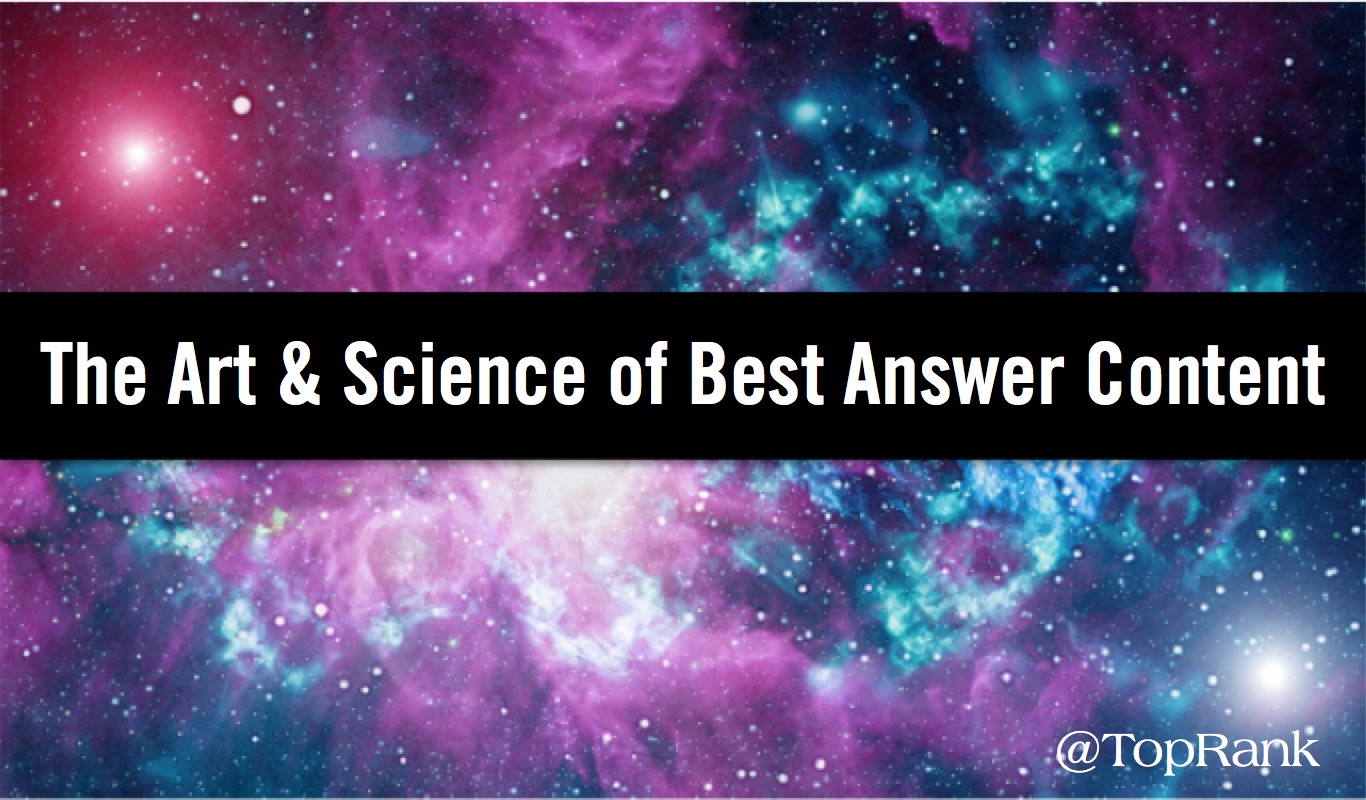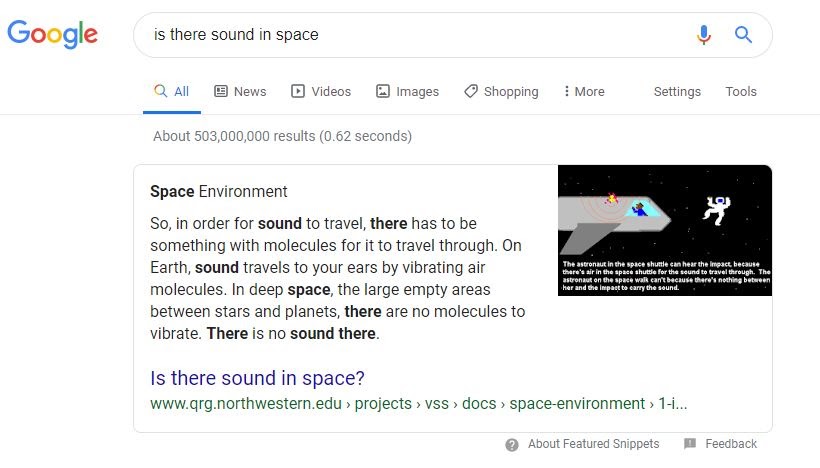
 As a marketer, I love experiencing the inner dynamics of our profession from the other side. Our agency talks so much about the value of delivering best answer content and fully satisfying a searcher’s curiosities; recently I experienced this value first-hand. Let’s set the stage. A couple weeks ago I was mindlessly flipping through channels on cable TV and I came across an old favorite: Alien, the 1979 sci-fi horror flick from director Ridley Scott. This classic film also had a classic tagline: “In space, no one can hear you scream.” In my boredom, I got to wondering about the validity of that statement, so I pulled up a Google search on my phone and typed in: is there sound in space. The featured snippet in the results answered that question so succinctly, so clearly, so comprehensively, that I was flat-out amazed. I’m no brainiac when it comes to the complexities of outer space, but in about 50 words, I gained a full understanding of what I wanted to learn:
As a marketer, I love experiencing the inner dynamics of our profession from the other side. Our agency talks so much about the value of delivering best answer content and fully satisfying a searcher’s curiosities; recently I experienced this value first-hand. Let’s set the stage. A couple weeks ago I was mindlessly flipping through channels on cable TV and I came across an old favorite: Alien, the 1979 sci-fi horror flick from director Ridley Scott. This classic film also had a classic tagline: “In space, no one can hear you scream.” In my boredom, I got to wondering about the validity of that statement, so I pulled up a Google search on my phone and typed in: is there sound in space. The featured snippet in the results answered that question so succinctly, so clearly, so comprehensively, that I was flat-out amazed. I’m no brainiac when it comes to the complexities of outer space, but in about 50 words, I gained a full understanding of what I wanted to learn:  It got me thinking: Isn’t this what content marketing is all about? Taking the complex and making it digestible? When it comes to ranking near the top of results for topics that matter to your audience, and delivering a best answer experience that builds trust, there’s both art and science at play. Launching from this opening example, let’s explore both dimensions.
It got me thinking: Isn’t this what content marketing is all about? Taking the complex and making it digestible? When it comes to ranking near the top of results for topics that matter to your audience, and delivering a best answer experience that builds trust, there’s both art and science at play. Launching from this opening example, let’s explore both dimensions.
The Science of Best Answer B2B Marketing Content
It’s no secret among digital marketers that the traditional technical signals for SEO have lost some of their impact in recent years, as Google shifts toward more of a user-driven algorithm. The example above is a perfect illustration: Despite landing in the most valuable SERP real estate for the query, did you notice that the actual pertinent keyword — “sound in space” — does not appear in the excerpted copy? A bygone SEO approach would’ve called for stuffing that exact phrase into the content (and page title, and meta description) for the piece you wanted to rank, but Google’s gotten much smarter over the years. It can inherently make the connections by stringing together the relevant words, and is more likely to prioritize a result that users are engaging with most, as opposed to one that offers the most precise keyword match. That brings us to the art of best answer content, which we’ll get to shortly. But there is still very much a methodical, proven science to this endeavor. Here are a few tried-and-true qualities that you’ll want to include for high-ranking content:Customer Insight
In my case, there was no way to anticipate I’d be prompted to run a search about sound in outer space by watching a 40-year-old movie on cable. Luckily, customer journeys tend to be more predictable and coherent. Understanding the questions your audience wants answered is possible through in-depth research around both the people you wish to reach, and the topics you’re crafting content around. via GIPHY In the past, I’ve detailed some of the ways to identify best answer opportunities, which include:- Reverse-engineering keyword data
- Consulting the “People also asked” feature in Google
- Leveraging schema markups
- Relying on keyword research tools
- Searching for whitespace in relevant SERPS
Structure and Focus
No, you don’t need to contort your content to repeatedly include the exact keyword you’re targeting — especially in cases where it hurts readability. But that isn’t to say you should be ignoring keywords and phrases entirely. While you don’t see the specific sequence “sound in space” in the snippet above, you do see plenty of instances of both “sound” and “space” in a way that feels natural to the writing. This helps Google understand the premise of the article. Technical signals do still matter, especially because your content has to appear in searches to begin with in order for user signals to matter. The answer from Northwestern University was also crafted in a way that made it well-suited for the featured snippet. Even in longer-form content, you can be intentional about this, as TopRank Marketing SEO Strategist Birdie Zepeda explains. “Keep the best part of your answer, the nugget you're really trying to get across, concise,” she says. “A featured snippet is roughly 280 to 315 characters. You've only got a couple of sentences to get the answer across.” [bctt tweet="Keep the best part of your answer, the nugget you're really trying to get across, concise. A featured snippet is roughly 280 to 315 characters. @birdie_zepeda #BestAnswerContent #B2BContentMarketing" username="toprank"]Experimentation
Experiments are fundamental to the scientific method, and also to digital marketing in pretty much every form. Smart strategy and seasoned experience go a long way, but the discipline will forever be founded on making educated guesses and bets, validating them through testing, and then implementing adjustments and optimizations along the way. This is why an always-on content marketing approach is so valuable; it enables continuous cycles of experimentation, understanding, and improvement. [bctt tweet="Why is an always-on content marketing approach is so valuable? it enables continuous cycles of experimentation, understanding, and improvement. @NickNelsonMN #BestAnswerContent" username="toprank"] via GIPHYThe Art of Best Answer B2B Marketing Content
The thing that really struck me about the sound in space snippet was how casual and conversational it is. It begins with, “So…” and keeps the language pretty simple, even though it’s discussing molecular principles in outer space. via GIPHY As a B2B marketer, this is a valuable thing to register. Given the subject matter we tend to cover, and the knowledgeable audiences we intend to reach, it can be all too easy to get caught up in professorial jargon. But that’s not generally what people want. This is something that John Joyce of Brennan Industries hammered home in his interview for our Break Free B2B series, when explaining how his company’s strategy, centered on educational content, yielded an 800% increase in leads. “What I’ve found is people don’t have time to just know everything about everything,” Joyce said. “So they really want you to make it easy and just tell them what they need to know.” [bctt tweet="People don’t have time to just know everything about everything. They really want you to make it easy and just tell them what they need to know. @mrjohnjoyce #BestAnswerContent" username="toprank"] Worth repeating: make it easy. To the extent you can avoid it, don’t bog people down with five-dollar words and industry lingo. Challenge yourself to be as human and straightforward as possible. At the same time, find creative ways to differentiate your content and make it stand out from the many others who are vying for the same SERP. This isn’t always easy to do. But it is the content marketer’s credo, and I believe it will be an increasingly vital aspect of successful B2B marketing content as we move forward.Strike a Balance with Your Best Answer Strategy
The internet is a vast expanse, and sometimes trying to gain visibility for competitive searches can feel like screaming into space. But rest assured, your brand can be heard. It takes a creative, human approach grounded in the modern science of good SEO. Ready to become the best answer, and satisfy your audience’s burning questions? Learn about TopRank Marketing’s SEO services and reach out to kick off the conversation today.The post The Science and Art of Best Answer B2B Marketing Content appeared first on Online Marketing Blog - TopRank®.
from Online Marketing Blog – TopRank® https://ift.tt/2RTFdAm
via IFTTT
No comments:
Post a Comment